Drug Interdiction on the Highways of Western Wisconsin
The following article was written for the National Highway Safety and Transportation Board, at the request of the Wisconsin Department of Transportation.
The photos are of a drug interdiction stop made by the Wisconsin State Patrol. Ed Frawley of the Dunn County Sheriff Department assisted the stop with his narcotics dog Gabby. The drugs were found after the dog indicated on the trunk of the vehicle.
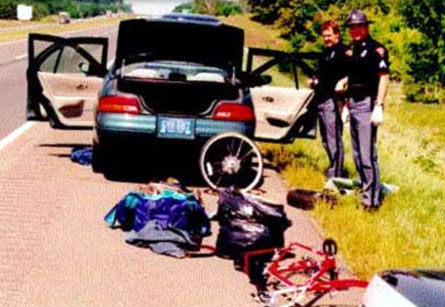
I am a reserve officer with the Dunn County Sheriff's Department in West Central Wisconsin. Over the past 6 years, I helped develop a K-9 drug interdiction program for our county that has seen a good deal of success on the roads and highways in Western Wisconsin.
My dog (Gabby) and I have assisted in over 350 drug arrests. We have assisted local law enforcement in the seizure of over $200,000.00 in cash and so many vehicles that I no longer keep count. While the majority of our arrests are for simple possession, it seems that several times a year, we catch a big fish with a pound of crack or methamphetamine or pounds of marijuana.
The purpose of this article is to explain how this program got started, and why it all works. Our program is a little different than others I have seen. We do not have the luxury of having dedicated teams of officers that just work interdiction. Instead, we have an area where deputies and state troopers have gone through drug interdiction training and have learned to be aggressive and call for a dog whenever they suspect any amount of drugs.
I am a professional dog trainer by trade. I have trained dogs for 35 years. For the past 16 years, I have owned a business that produces videos on how to train police service dogs, tracking dogs, and sport dogs. I sell my training videos over the Internet here in Menomonie, WI.
In 1989, I offered to donate a trained narcotics detection dog to our Sheriff's department. Dunn County did not have a canine. It is a small department with 11 full-time deputies and a small reserve force. My original intent was to find a dog and train it myself, then train an officer on how to handle the dog. I would also assist in its maintenance training. After a few conversations with our Sheriff (Robert Zebro), he asked if I would consider joining the reserves and handling the dog myself.
The dog I chose to train was a black lab that I named Gabby. She was rescued from our local dog pound the day before she was to be put to sleep. She has the greatest personality you could ever want in a drug dog.
When we look at a candidate for this work, we need a dog that is crazy to play with a ball or toy. We want a dog that would rather play than eat or sleep. These dogs have to want to chase their ball anywhere, anytime, day or night. A good drug dog will never quit looking for the stick that you toss in a field of tall grass. Gabby passed all the selection tests with flying colors. In fact, she had one of the best temperaments I had ever seen for narcotics work.
Normally, it takes 8 to 12 weeks for the basic narcotics dog training, then another 6 to 8 months of work on the road to get the dog to its peak performance. The simplest description I can use to describe the training is that we train the dog to understand that if it will locate the odor of narcotics and scratch at that location, we will give it a ball or toy to play with. That's what a good drug dog lives for: to play with its toy. When a new K-9 handler joins a department that has never had dogs before, there is always the same reaction from the other officers. There is the initial interest in the dog but then there is the underlying attitude of "Let's wait and see what this dog can do."
For new dog handlers, this amounts to a lot of pressure. Initially, the fear is that your dog will miss a load of drugs and make you look like a fool. God forbid that ever happens. That fear was the driving force for me to constantly train my dog.
A good drug interdiction program does not happen just because of one officer and his dog. A program like ours works because of a group effort. That's the key to our success.
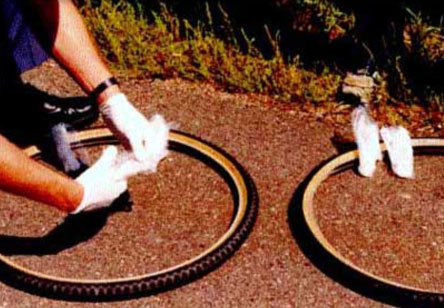
Dunn County has a sheriff that is respected by his deputies, by other law enforcement agencies, and by the citizens of the community. Sheriff Robert Zebro (Zed) is a natural leader that people look up to. He used to work drugs and he is the reason I offered to donate my time and this dog. He is also the reason that there is such a good relationship with our department and all the surrounding law enforcement agencies. Without these relationships, I do not think this program would work. Zed made it known to the Wisconsin State Patrol (WSP), to the Wisconsin Department of Narcotic's Enforcement (DNE), to the local drug task force (West Central Drug), and the surrounding counties that did not have dogs, that we would be willing to assist with our dog when and if they ever needed help. That was the key to get the ball rolling.
There are several factors that go into making a successful drug interdiction program. You must have a K-9 team that will always respond. You need to have a group of deputies and officers that are trained in drug interdiction and willing to aggressively go out and work drugs. Finally, everyone involved needs to have the mentality of a Musky fisherman. That is, "you need to be willing to make a thousand casts before you catch the big fish." More than anything, this bulldog attitude to not quit hunting drug dealers is what makes the program work.
The way I work with our department is to wear a pager and basically be on 24-hour call. In 6 years, I think I only turned down 2 or 3 calls for assistance. When the deputies and WSP Officers learned that I was willing to respond at all hours of the day or night, (and many times more than once a night), they got excited about calling for the dog when there were drug indicators in the vehicle.
From the beginning, it was my personal feeling that the road officers had to know for sure that K-9 will always come if called. I have seen other agencies where the K-9 officers refused calls when not on duty. Eventually what happens in these departments is the dog team was called less and less for normal drug interdiction. The street officers lost confidence in the K-9 response and when that happens, everyone loses the attitude of the musky fisherman.
Just because we have a dog available does not mean we had an interdiction program. For me, the most important part of the team is the road deputy and trooper that are out there making traffic stops. These are the guys that need to know when to call for a dog. These are the guys that need to develop the sixth sense on when there are drugs in a vehicle. Unless they are trained in drug interdiction they will not know when to call. We are lucky in Dunn County to have Sgt. Jay Sampson of the WSP. He is the head drug interdiction trainer for WSP in addition to being a national drug interdiction instructor for the DEA and the EPIC/pipeline convoy-training program.
Jay has instilled an attitude in his men and women that produces results. Dunn County is located in WSP District Six, which has the highest number of drug arrests in the state of Wisconsin. That fact is directly attributed to the training and attitude that Jay instills in his people.
The last part of a successful highway interdiction program is the narcotics officers that are willing to come in and interview the suspects we find with drugs. In our county, we have County Investigator Russ Cragin and Investigator Mike Olson (of the Menomonie Police Department). They both only work drugs. These two investigators have a talent for turning 1/2 OZ. and 1 OZ. marijuana possession cases into investigations that lead to the arrests of major dealers and the seizure of their assets.
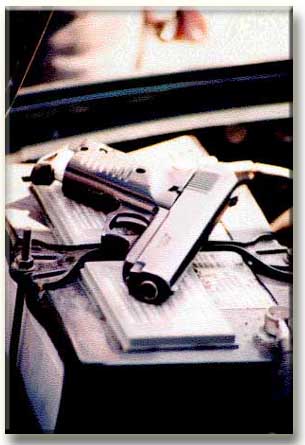
So in conclusion, the thing that I have learned in the past six years is that a good drug interdiction program is a lot more than a canine unit out on the highway. It's a team effort that starts with management offering the right support. It's the well-trained aggressive Road Deputy and Highway Patrol officers that are out there hunting drug dealers 24 hours a day. It's the canine officer that's always willing to come out when called. And finally, it's the narcotics officers that are willing to come in the middle of the night and interview a suspect with the hope that they roll on their source.
After 6 years of getting up several times a week and being called in at all times of the day and night, I finally convinced Zeb that I needed help. This past January, we added a second K-9 officer to our small department. Officer Todd Kurtzhals and his K-9 partner Jago, completed K-9 training in March and are now working the interstate and roads of Dunn County. Todd had close to 80 narcotics arrests last year without a dog. I shake my head and wonder what's going to happen in the years ahead when he and Jago are on the road full time and not just on-call like I was.
It was a happy day in my life when I called dispatch and told them to put my name second on the call list. In the last 2 months, I have only had to get up twice in the middle of the night. Gabby is getting old but she hasn't lost her touch. Last Friday, we assisted in 7 search warrants and the arrest of 18 suspects. Gabby found dope behind a false wall, she found dope rolled up in socks in dresser drawers, and in several other places the officers had already hand searched.



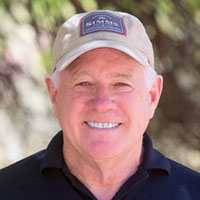
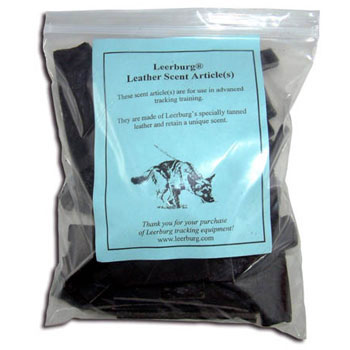
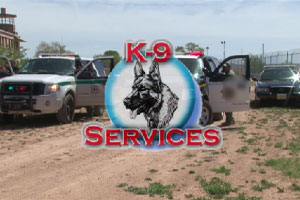
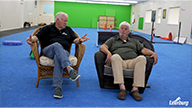


Ask Cindy.